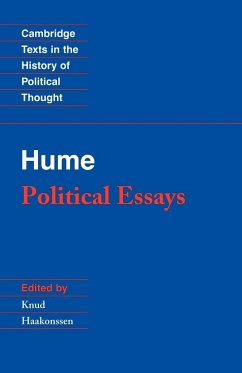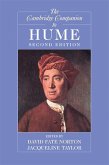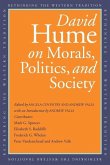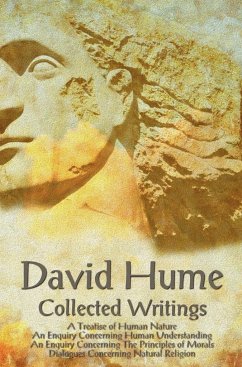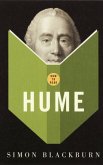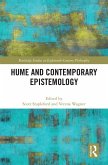- Broschiertes Buch
- Merkliste
- Auf die Merkliste
- Bewerten Bewerten
- Teilen
- Produkt teilen
- Produkterinnerung
- Produkterinnerung
David Hume, commonly known as one of the greatest philosophers to write in English, was also an outstanding political and economic theorist and historian. His twenty-seven most important political essays are presented in this fully annotated edition.
Andere Kunden interessierten sich auch für
![Hume Hume]() James A. Harris (Scotland University of St Andrews)Hume37,99 €
James A. Harris (Scotland University of St Andrews)Hume37,99 €![The Cambridge Companion to Hume The Cambridge Companion to Hume]() The Cambridge Companion to Hume39,99 €
The Cambridge Companion to Hume39,99 €![David Hume on Morals, Politics, and Society David Hume on Morals, Politics, and Society]() David HumeDavid Hume on Morals, Politics, and Society14,99 €
David HumeDavid Hume on Morals, Politics, and Society14,99 €![David Hume - Collected Writings (Complete and Unabridged), a Treatise of Human Nature, an Enquiry Concerning Human Understanding, an Enquiry Concernin David Hume - Collected Writings (Complete and Unabridged), a Treatise of Human Nature, an Enquiry Concerning Human Understanding, an Enquiry Concernin]() David HumeDavid Hume - Collected Writings (Complete and Unabridged), a Treatise of Human Nature, an Enquiry Concerning Human Understanding, an Enquiry Concernin63,99 €
David HumeDavid Hume - Collected Writings (Complete and Unabridged), a Treatise of Human Nature, an Enquiry Concerning Human Understanding, an Enquiry Concernin63,99 €![How To Read Hume How To Read Hume]() Simon BlackburnHow To Read Hume18,99 €
Simon BlackburnHow To Read Hume18,99 €![Hume Hume]() Don Garrett (USA New York University)Hume26,99 €
Don Garrett (USA New York University)Hume26,99 €![Hume and Contemporary Epistemology Hume and Contemporary Epistemology]() Hume and Contemporary Epistemology142,99 €
Hume and Contemporary Epistemology142,99 €-
-
-
David Hume, commonly known as one of the greatest philosophers to write in English, was also an outstanding political and economic theorist and historian. His twenty-seven most important political essays are presented in this fully annotated edition.
Hinweis: Dieser Artikel kann nur an eine deutsche Lieferadresse ausgeliefert werden.
Hinweis: Dieser Artikel kann nur an eine deutsche Lieferadresse ausgeliefert werden.
Produktdetails
- Produktdetails
- Cambridge Texts in the History of Political Thought
- Verlag: Cambridge University Press
- Seitenzahl: 416
- Erscheinungstermin: 25. März 2008
- Englisch
- Abmessung: 216mm x 140mm x 24mm
- Gewicht: 546g
- ISBN-13: 9780521466394
- ISBN-10: 0521466393
- Artikelnr.: 22194511
- Herstellerkennzeichnung
- Libri GmbH
- Europaallee 1
- 36244 Bad Hersfeld
- gpsr@libri.de
- Cambridge Texts in the History of Political Thought
- Verlag: Cambridge University Press
- Seitenzahl: 416
- Erscheinungstermin: 25. März 2008
- Englisch
- Abmessung: 216mm x 140mm x 24mm
- Gewicht: 546g
- ISBN-13: 9780521466394
- ISBN-10: 0521466393
- Artikelnr.: 22194511
- Herstellerkennzeichnung
- Libri GmbH
- Europaallee 1
- 36244 Bad Hersfeld
- gpsr@libri.de
David Home, a Scottish Enlightenment philosopher, historian, economist, librarian, and essayist who lived from 7 May 1711 NS (26 April 1711 OS) to 25 August 1776, was most recognized today for his very important school of philosophical empiricism, skepticism, and naturalism. Hume worked to establish a naturalistic science of man that looked at the psychological underpinnings of human nature, starting with A Treatise of Human Nature (1739-1740). Hume contended that there are no inborn notions and that all human understanding comes only through experience. As an empiricist, he is so grouped with Francis Bacon, Thomas Hobbes, John Locke, and George Berkeley. Inductive reasoning and the notion of causation, according to Hume, cannot be supported by logic; rather, they are the products of mental habits and custom. Due to the induction problem, it is impossible to provide the basis for the premise that the future will resemble the past, which is required in order to draw any causal conclusions from the past. Hume also rejected the idea that people have a true sense of who they are, asserting that what we actually experience is a collection of sensations and that the self is nothing more than this collection of causally related experiences.
1. Of the liberty of the press
2. That politics may be reduced to a science
3. Of the first principles of government
4. Of the origin of government
5. Of the independency of Parliament
6. Whether the British government inclines more to absolute monarchy, or to a republic
7. Of parties in general
8. Of the parties of Great Britain
9. Of superstition and enthusiasm
10. Of civil liberty
11. Of the rise and progress of the arts and sciences
12. Of national characters
13. Of commerce
14. Of refinement in the arts
15. Of money
16. Of interest
17. Of the balance of trade
18. Of the jealousy of trade
19. Of the balance of power
20. Of taxes: 21. Of public credit
22. Of some remarkable customs
23. Of the original contract
24. Of passive obedience
25. Of the coalition of parties
26. Of the Protestant succession
27. Idea of a perfect commonwealth
Appendix.
2. That politics may be reduced to a science
3. Of the first principles of government
4. Of the origin of government
5. Of the independency of Parliament
6. Whether the British government inclines more to absolute monarchy, or to a republic
7. Of parties in general
8. Of the parties of Great Britain
9. Of superstition and enthusiasm
10. Of civil liberty
11. Of the rise and progress of the arts and sciences
12. Of national characters
13. Of commerce
14. Of refinement in the arts
15. Of money
16. Of interest
17. Of the balance of trade
18. Of the jealousy of trade
19. Of the balance of power
20. Of taxes: 21. Of public credit
22. Of some remarkable customs
23. Of the original contract
24. Of passive obedience
25. Of the coalition of parties
26. Of the Protestant succession
27. Idea of a perfect commonwealth
Appendix.
1. Of the liberty of the press
2. That politics may be reduced to a science
3. Of the first principles of government
4. Of the origin of government
5. Of the independency of Parliament
6. Whether the British government inclines more to absolute monarchy, or to a republic
7. Of parties in general
8. Of the parties of Great Britain
9. Of superstition and enthusiasm
10. Of civil liberty
11. Of the rise and progress of the arts and sciences
12. Of national characters
13. Of commerce
14. Of refinement in the arts
15. Of money
16. Of interest
17. Of the balance of trade
18. Of the jealousy of trade
19. Of the balance of power
20. Of taxes: 21. Of public credit
22. Of some remarkable customs
23. Of the original contract
24. Of passive obedience
25. Of the coalition of parties
26. Of the Protestant succession
27. Idea of a perfect commonwealth
Appendix.
2. That politics may be reduced to a science
3. Of the first principles of government
4. Of the origin of government
5. Of the independency of Parliament
6. Whether the British government inclines more to absolute monarchy, or to a republic
7. Of parties in general
8. Of the parties of Great Britain
9. Of superstition and enthusiasm
10. Of civil liberty
11. Of the rise and progress of the arts and sciences
12. Of national characters
13. Of commerce
14. Of refinement in the arts
15. Of money
16. Of interest
17. Of the balance of trade
18. Of the jealousy of trade
19. Of the balance of power
20. Of taxes: 21. Of public credit
22. Of some remarkable customs
23. Of the original contract
24. Of passive obedience
25. Of the coalition of parties
26. Of the Protestant succession
27. Idea of a perfect commonwealth
Appendix.

